新概念英语第二册Lesson 2 Breakfast or lunch? 课件(共41张PPT)
文档属性
| 名称 | 新概念英语第二册Lesson 2 Breakfast or lunch? 课件(共41张PPT) |  | |
| 格式 | pptx | ||
| 文件大小 | 63.0MB | ||
| 资源类型 | 教案 | ||
| 版本资源 | 新概念英语 | ||
| 科目 | 英语 | ||
| 更新时间 | 2022-06-03 10:31:36 | ||
图片预览


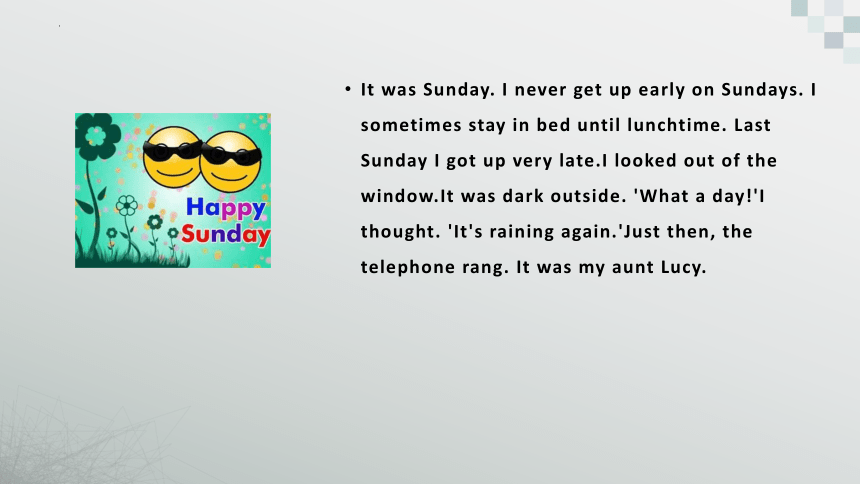
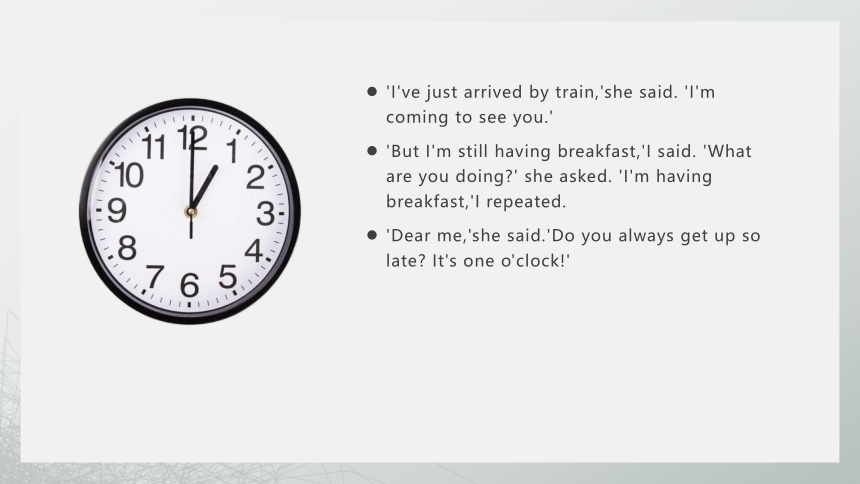

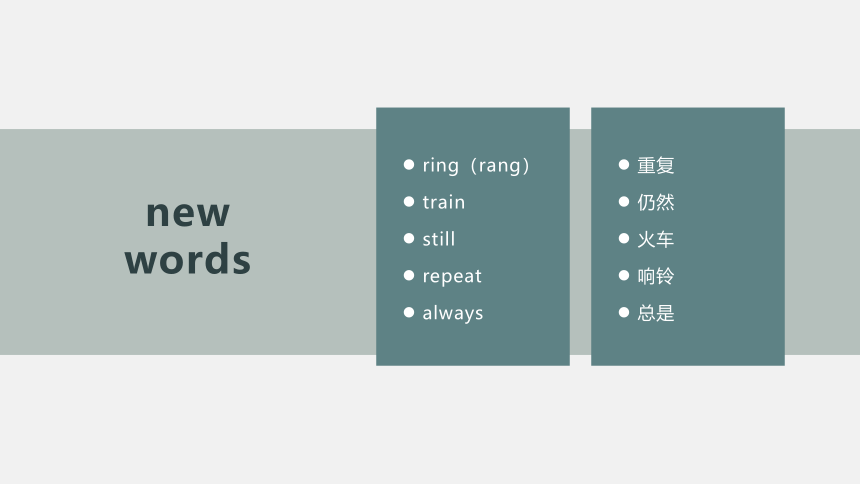

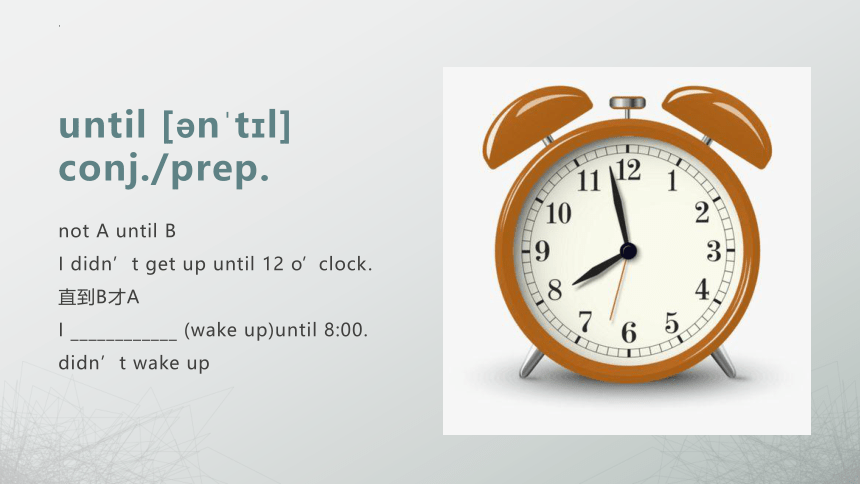
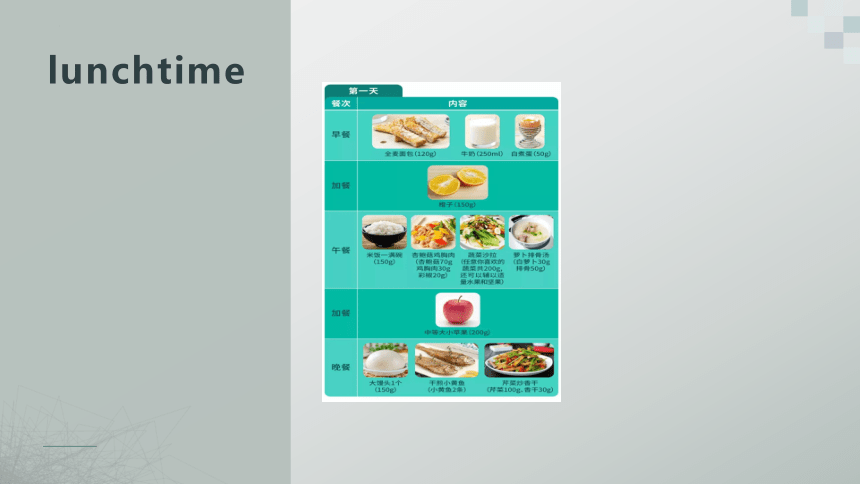
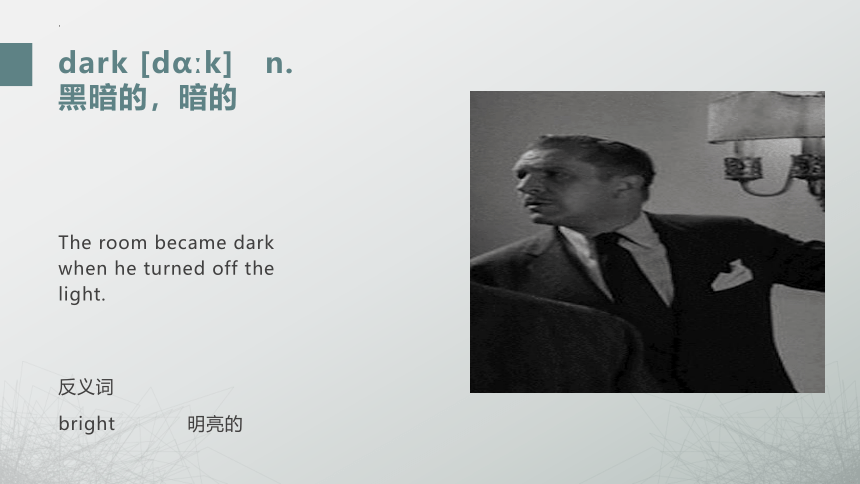
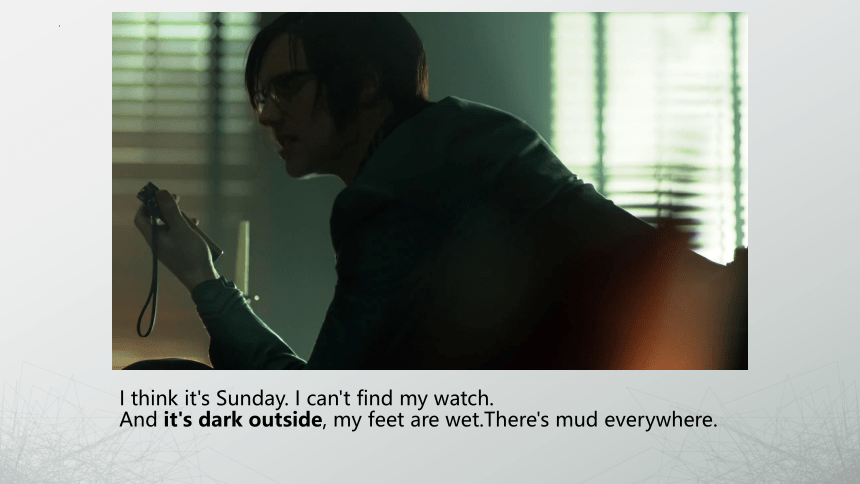
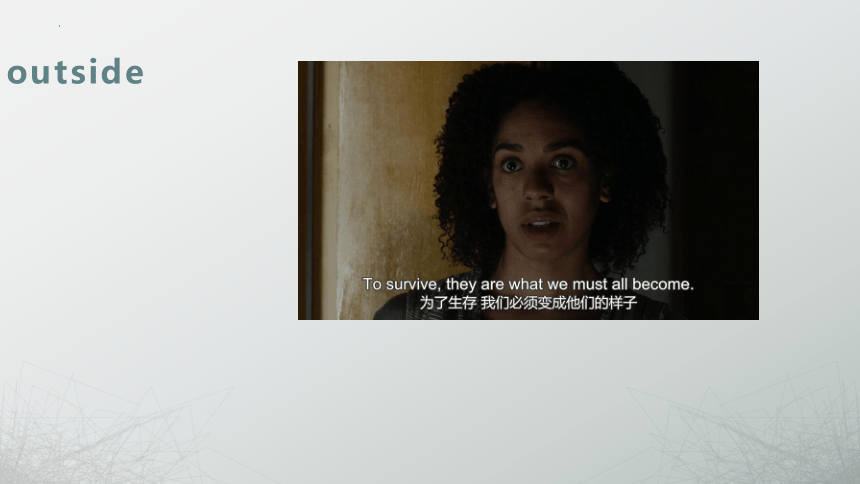
文档简介
(共41张PPT)
新概念第二册第二课
Breakfast or lunch?
早餐还是午餐?
It was Sunday. I never get up early on Sundays. I sometimes stay in bed until lunchtime. Last Sunday I got up very late.I looked out of the window.It was dark outside. 'What a day!'I thought. 'It's raining again.'Just then, the telephone rang. It was my aunt Lucy.
'I've just arrived by train,'she said. 'I'm coming to see you.'
'But I'm still having breakfast,'I said. 'What are you doing ' she asked. 'I'm having breakfast,'I repeated.
'Dear me,'she said.'Do you always get up so late It's one o'clock!'
new words
until
lunchtime
dark
outside
telephone
think(thought)
外面
想;认为
午饭时间
电话
直到
黑暗的
new words
ring(rang)
train
still
repeat
always
重复
仍然
火车
响铃
总是
until prep. 直到
until [ n t l] conj./prep.
not A until B
I didn’t get up until 12 o’clock.
直到B才A
I ____________ (wake up)until 8:00.
didn’t wake up
lunchtime
dark [dɑ k] n. 黑暗的,暗的
The room became dark when he turned off the light.
反义词
bright 明亮的
I think it's Sunday. I can't find my watch.
And it's dark outside, my feet are wet.There's mud everywhere.
outside
outside
adv. 外面(作状语)
外面很冷。
It is cold outside.
n. 外面
门从外面上了锁
The door was locked from the outside.
adj. 外面的
如果你打外线电话就需要付费。
You have to pay to make outside calls.
ring(rang. rung)
① vt. 鸣,(铃、电话等)响(往往是提醒人做某事)
电话/门铃响了。
The telephone(door bell) is ringing.
② vt. 打电话给(美语中用call)
明天我会给你打电话
Tomorrow I'll ring you.
③ n. (打)电话 give sb. a ring
记得明天给我打电话
Remember to give me a ring. /Remember to ring me.
④ n. 戒指
他给了她一个钻石戒指作为生日礼物
He gives her a diamond ring as a birthday present.
Ring the bell.train
n. 火车
火车即将到来。
The train is coming.
vt. 训练
他训练奥林匹克队。
He trains the Olympic team.
repeat
① vt. 重复
你能重复最后一个词吗?
Will you repeat the last word
跟著我念这些句子
Repeat these sentences after me.
② vi. 重做,重说
她只是反覆地做同样的事
She did nothing but repeated.
it
it指时间、天气、温度或距离,被称为“虚主语”。
作为第三人称单数的中性代词,it可以指一件东西、一件事件或用来指是什么人:
从公司到我家大概有5公里。
It is about 5 kilometer from the company to my home.
这是个可爱的小婴儿。
It is a lovely baby.
It was Sunday.
it指时间、天气、温度或距离,被称为“虚主语”。
作为第三人称单数的中性代词,it可以指一件东西、一件事件或用来指是什么人:
从公司到我家大概有5公里。
It is about 5 kilometer from the company to my home.
这是个可爱的小婴儿。
It is a lovely baby.
on Sundays
所有的星期天,每逢星期天,与一般现在时连用,表示经常性的行为。
Okay, so we will see you __ ________ __ __________ ____________.
Thank you so much.
Okay, so we will see you at 10:45 on Friday morning.
Thank you so much.
3.I sometimes stay in bed until lunchtime.
stay in bed 躺在床上,卧床休息
在表达卧床时bed前不需加冠词:
你必须再卧床两天。
You must stay in bed for another two days.
到上床睡觉的时候了。
It’s time for bed now.
4. Last Sunday I got up very late.
get up 起床
5.I looked out of the window. It was dark outside.
'What a day!' I thought. 'It's raining again.’
在英语中可用what引导的感叹句来表示惊奇、愤怒、赞赏、喜悦等感情,在感叹中主谓语采用正常语序。
结构为:What +(a/an )(+adj.)+n.(+主语+谓语)!
What a good girl (she is)! (主、谓可省)
有上下文和一定的语境, 才能省略形容词。一般省略形容词表示批评或不大好的意思。
What (a lot of) trouble( he is causing)!
他弄出多少麻烦啊!
What a good girl (she is)!
她真是个好女孩啊!
How clever (you are)!
你真聪明啊!
What +(a/an )(+adj.)+n.(+主语+谓语)!
How +adj.(+主语+谓语)!
6.Just then, the telephone rang. It was my aunt Lucy.
just then: 就在那时
如果不知道对方性别, 他/她可以用it取代
这是谁?
Who is it
7. 'I've just arrived by train,' she said. 'I'm coming to see you.'
by train / bus / air / boat /taxi … 乘火车/汽车…
on foot 步行
by/on 后的名词是单数,名词不加冠词,
take a train/bus/boat/taxi… 动词,作谓语
eg. In Japan, most students take trains to school.
= In Japan, most students go to school by train.
8.I am coming to see you.
come, go, arrive, leave 等动词的现在进行时,表示为将来安排好的活动和事件。
He’s arriving this evening .
He’s leaving tomorrow afternoon.
一般现在时和现在进行时
Now:
It’s raining .
I’m coming to see you.
I’m still having breakfast.
What are you doing
She’s reading in bed now.
Often and always:
I never get up early on Sundays.
I sometimes stay in bed until lunchtime.
Do you always get up so late
I often buy CDs.
Do you ever buy CDs
时间状语 动词
I am looking out of my window. I can see some children in the street. The children ____(play) football. They always______(play) football in the street. Now a litte boy _____(kick)the ball. Another boy ______(run) after him but he cannot catch him.
2. I carried my bags into the hall.
'What ______ you ______(do) 'my landlady asked.
'I ___________(leave), Mrs. Lynch,'I answered.
'Why ______ you_____(leave) 'she asked.'You have been here only a week.'
'A week too long,Mrs. Lynch,'I said.'There are too many rules in this house.My friends never _____________(come) to visit me. Dinner is always at seven o'clock,so I frequently___(go) to bed hungry. You don't like noise, so I rarely_____(listen)to the radio. The heating doesn't work,so I always__________(feel)cold.This is a terrible place for a man like me. Goodbye,Mrs.Lynch.'
Breakfast is the first_______of the day.
A.food B.dinner
C.lunch D.meal
新概念第二册第二课
Breakfast or lunch?
早餐还是午餐?
It was Sunday. I never get up early on Sundays. I sometimes stay in bed until lunchtime. Last Sunday I got up very late.I looked out of the window.It was dark outside. 'What a day!'I thought. 'It's raining again.'Just then, the telephone rang. It was my aunt Lucy.
'I've just arrived by train,'she said. 'I'm coming to see you.'
'But I'm still having breakfast,'I said. 'What are you doing ' she asked. 'I'm having breakfast,'I repeated.
'Dear me,'she said.'Do you always get up so late It's one o'clock!'
new words
until
lunchtime
dark
outside
telephone
think(thought)
外面
想;认为
午饭时间
电话
直到
黑暗的
new words
ring(rang)
train
still
repeat
always
重复
仍然
火车
响铃
总是
until prep. 直到
until [ n t l] conj./prep.
not A until B
I didn’t get up until 12 o’clock.
直到B才A
I ____________ (wake up)until 8:00.
didn’t wake up
lunchtime
dark [dɑ k] n. 黑暗的,暗的
The room became dark when he turned off the light.
反义词
bright 明亮的
I think it's Sunday. I can't find my watch.
And it's dark outside, my feet are wet.There's mud everywhere.
outside
outside
adv. 外面(作状语)
外面很冷。
It is cold outside.
n. 外面
门从外面上了锁
The door was locked from the outside.
adj. 外面的
如果你打外线电话就需要付费。
You have to pay to make outside calls.
ring(rang. rung)
① vt. 鸣,(铃、电话等)响(往往是提醒人做某事)
电话/门铃响了。
The telephone(door bell) is ringing.
② vt. 打电话给(美语中用call)
明天我会给你打电话
Tomorrow I'll ring you.
③ n. (打)电话 give sb. a ring
记得明天给我打电话
Remember to give me a ring. /Remember to ring me.
④ n. 戒指
他给了她一个钻石戒指作为生日礼物
He gives her a diamond ring as a birthday present.
Ring the bell.train
n. 火车
火车即将到来。
The train is coming.
vt. 训练
他训练奥林匹克队。
He trains the Olympic team.
repeat
① vt. 重复
你能重复最后一个词吗?
Will you repeat the last word
跟著我念这些句子
Repeat these sentences after me.
② vi. 重做,重说
她只是反覆地做同样的事
She did nothing but repeated.
it
it指时间、天气、温度或距离,被称为“虚主语”。
作为第三人称单数的中性代词,it可以指一件东西、一件事件或用来指是什么人:
从公司到我家大概有5公里。
It is about 5 kilometer from the company to my home.
这是个可爱的小婴儿。
It is a lovely baby.
It was Sunday.
it指时间、天气、温度或距离,被称为“虚主语”。
作为第三人称单数的中性代词,it可以指一件东西、一件事件或用来指是什么人:
从公司到我家大概有5公里。
It is about 5 kilometer from the company to my home.
这是个可爱的小婴儿。
It is a lovely baby.
on Sundays
所有的星期天,每逢星期天,与一般现在时连用,表示经常性的行为。
Okay, so we will see you __ ________ __ __________ ____________.
Thank you so much.
Okay, so we will see you at 10:45 on Friday morning.
Thank you so much.
3.I sometimes stay in bed until lunchtime.
stay in bed 躺在床上,卧床休息
在表达卧床时bed前不需加冠词:
你必须再卧床两天。
You must stay in bed for another two days.
到上床睡觉的时候了。
It’s time for bed now.
4. Last Sunday I got up very late.
get up 起床
5.I looked out of the window. It was dark outside.
'What a day!' I thought. 'It's raining again.’
在英语中可用what引导的感叹句来表示惊奇、愤怒、赞赏、喜悦等感情,在感叹中主谓语采用正常语序。
结构为:What +(a/an )(+adj.)+n.(+主语+谓语)!
What a good girl (she is)! (主、谓可省)
有上下文和一定的语境, 才能省略形容词。一般省略形容词表示批评或不大好的意思。
What (a lot of) trouble( he is causing)!
他弄出多少麻烦啊!
What a good girl (she is)!
她真是个好女孩啊!
How clever (you are)!
你真聪明啊!
What +(a/an )(+adj.)+n.(+主语+谓语)!
How +adj.(+主语+谓语)!
6.Just then, the telephone rang. It was my aunt Lucy.
just then: 就在那时
如果不知道对方性别, 他/她可以用it取代
这是谁?
Who is it
7. 'I've just arrived by train,' she said. 'I'm coming to see you.'
by train / bus / air / boat /taxi … 乘火车/汽车…
on foot 步行
by/on 后的名词是单数,名词不加冠词,
take a train/bus/boat/taxi… 动词,作谓语
eg. In Japan, most students take trains to school.
= In Japan, most students go to school by train.
8.I am coming to see you.
come, go, arrive, leave 等动词的现在进行时,表示为将来安排好的活动和事件。
He’s arriving this evening .
He’s leaving tomorrow afternoon.
一般现在时和现在进行时
Now:
It’s raining .
I’m coming to see you.
I’m still having breakfast.
What are you doing
She’s reading in bed now.
Often and always:
I never get up early on Sundays.
I sometimes stay in bed until lunchtime.
Do you always get up so late
I often buy CDs.
Do you ever buy CDs
时间状语 动词
I am looking out of my window. I can see some children in the street. The children ____(play) football. They always______(play) football in the street. Now a litte boy _____(kick)the ball. Another boy ______(run) after him but he cannot catch him.
2. I carried my bags into the hall.
'What ______ you ______(do) 'my landlady asked.
'I ___________(leave), Mrs. Lynch,'I answered.
'Why ______ you_____(leave) 'she asked.'You have been here only a week.'
'A week too long,Mrs. Lynch,'I said.'There are too many rules in this house.My friends never _____________(come) to visit me. Dinner is always at seven o'clock,so I frequently___(go) to bed hungry. You don't like noise, so I rarely_____(listen)to the radio. The heating doesn't work,so I always__________(feel)cold.This is a terrible place for a man like me. Goodbye,Mrs.Lynch.'
Breakfast is the first_______of the day.
A.food B.dinner
C.lunch D.meal
同课章节目录
- Unit 1 Hello!
- Unit 2 Yummy!
- Unit 3 Look at your red nose!
- Unit 4 Thank you, Mum!
- Unit 5 Look! The zoo!
- Unit 6 This is my family.
- Unit 7 Happy birthday!
- Unit 8 That's my book.
- Unit 9 What's this, Mum?
- Unit 10 I'm ten!
- Unit 11 Flora is tall.
- Unit 12 I'm a doctor.
- Unit 13 This is his rabbit.
- Unit 14 What colour is your T-shirt?
- Unit 15 Where's my bone?
